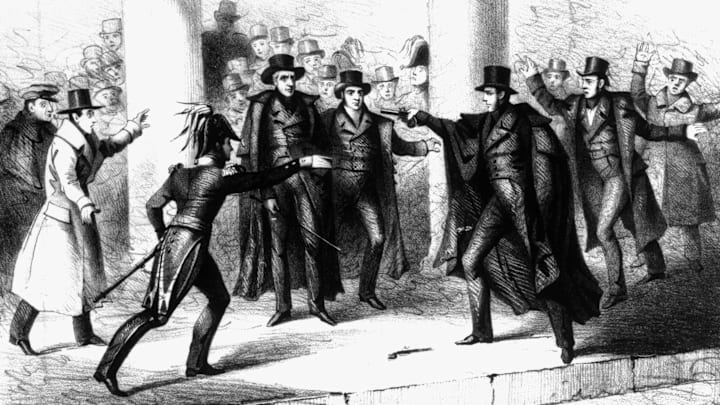Andrew Jackson was one of the most controversial early American politicians, which makes it little surprise that he was the target of the country's first presidential assassination attempt. He made many enemies throughout his life, participating in duels for personal and political reasons, as well as making such strong political moves that he was actually censured by Congress.
In spite of this, he was beloved by the common man, as he had been led to run for President by popular demand. Jackson made some controversial political decisions, including pushing to eliminate the electoral college, but they seemed to generally be motivated by a desire to put the average person on the same level as the wealthy when it came to democracy.
Despite all of the controversy, he was the target of murderous intent for largely unrelated reasons. While his would-be assassin did reference the Second US Bank (one of the policies Jackson was best known for hating), other circumstances seemed to suggest that the attempt was more to do with madness than political action.
On January 30, 1835, the United States saw the first assassination attempt against a sitting president when Andrew Jackson was shot at during a public event. Here's what you need to know about how and why it happened.
Who was the intended assassin?
Richard Lawrence was an immigrant who moved from England to the United States in his late adolescence. Little is known about his youth, though it was theoretically a fairly standard childhood according to accounts during his trial.
As an adult, Lawrence found work as a house painter, which would earn between $1 and $1.25 per day in the 1820s and 30s. According to an 1833 document, a reasonable cost of living for a family with a man, his wife, and two children was around $166.21 annually. This would presumably have been easily within reach for a man such as Lawrence, who only had himself to provide for.
Around 1832, however, Lawrence began exhibiting erratic behavior. He kept planning to travel, only to have his plans change seemingly at random, leading up to his announcement that President Andrew Jackson was keeping him from the money he was rightfully owed, by virtue of being King Richard III of England.
What happened on January 30, 1835?
On January 30, 1835, President Andrew Jackson attended the funeral of a former South Carolina Representation named Warren R. Davis. This was where Lawrence intended to kill the President. He shot at Jackson twice as he left the funeral, including once at point-blank range, but both of his pistols misfired.
He had apparently been stalking the president in the days leading up to the assassination attempt, suggesting some degree of premeditation. On the day of, he was seen laughing to himself before abruptly announcing "I'll be damned if I don't do it," and leaving his shop.
Unfortunately for him, the damp weather seemed to have prevented the gunpowder from igniting. Despite not actually being harmed, the President was rather unhappy at the attempt and promptly began beating Lawrence with his cane until Davy Crockett intervened.
An account of the assassination attempt describes Jackson's response as follows:
"If he had not been jerked back by his friends, [he] would probably have knocked the 2nd pistol out of the fellow's hand—by striking his arm with a cane—& would then have laid him out—by another blow over the head!!! They say he rose a foot taller than usual!"H. to his wife, February 2, 1835
Altogether, it was a fairly pitiful attempt, though the event itself became fairly iconic. Nobody was foolish enough to try to kill Andrew Jackson again.
The aftermath of Richard Lawrence's failed assassination attempt
Lawrence went to trial on April 11, 1835, where he was found "not guilty; he being under the influence of insanity at the time he committed the act." While there were many theories about who might have led Lawrence to shoot at Jackson, no conspiracy was ever confirmed.
One possible collaborator with Lawrence was John C. Calhoun, who had been Jackson's former vice president. He was rumored to have once made a comment that Jackson was "a Caesar who ought to have a Brutus." However, this theory didn't stop his political career, as he continued to participate in US politics through 1850.
Richard Lawrence was not so lucky. He spent the rest of his life in mental institutions until his death in 1861.
While the attempted assassination of Andrew Jackson was an unquestionable failure, it seems to have broken the perceived sanctity of the presidency. Within the next 50 years, there were four more attempts, including the successful killings of Abraham Lincoln in 1865 and James Garfield in 1881.
Check back for more segments of "This Day in History" on Ask Everest.
Got questions about history, trivia, or anything else? Send an email to askeverest@fansided.com and we might answer here on the site!
